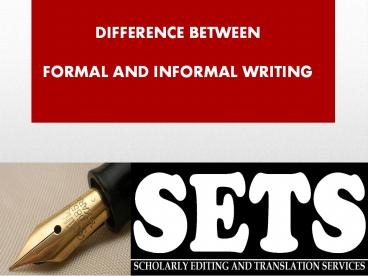Informal formal writing done at SETS - PowerPoint PPT Presentation
Title:
Informal formal writing done at SETS
Description:
SETS style of writing, describing information, presentation, and word usage and assembling makes writing formal/informal. – PowerPoint PPT presentation
Number of Views:21
Title: Informal formal writing done at SETS
1
DIFFERENCE BETWEEN FORMAL AND INFORMAL WRITING
2
How to determine formal/informal styles of
writing?
To define formal/informal style of writing you
need to know whom you are catering your
content Know your target audience Publication
type
3
What makes writing formal/informal?
The style of writing, describing information,
presentation, and word usage and assembling makes
writing formal/informal. For Example The
manner we write academic papers differs from the
manner we write to family. The vocabulary, syntax
and tone changes completely, thus make manuscript
writing formal while writing to family informal.
4
What makes writing formal/informal?
INFORMAL FORMAL
Informal words/expressions can be used while writing (kids, guy, amazing, a lot, etc.) Use of informal words/expressions must be avoided while writing (substitute with children, man/boy, wonderful, many, etc.)
Contractions can be used (can't, shouldn't, won't, etc.) Contractions must be avoided (write out full words - cannot, should not, will not, etc.)
First, second, or third person can be used. Should write as third person (Exception In business communication use First person).
Clichés can be used (loads of, little did I know, etc.) Clichés use must be avoided (use many, unknowingly, etc.)
2nd person pronouns can be used to address people (you, your, etc) Second person pronouns should not be used to address the readers (use one, one's, the reader, the reader's, etc.)
5
What makes writing formal/informal?
Can use word abbreviations (photo, TV, etc.) Avoid abbreviations (use television, photograph, etc.)
Imperative voice may be used (e.g. Remember....) Imperative voice usage must be avoided (use Please refer to...)
May use active voice (e.g. We have notice that.....) Use passive voice (e.g. It has been noticed that....)
Simple and short sentences can be used for writing Longer and more complex sentences are not preferred when writing (short simple sentences reflects poorly on the writer)
Difficulty of subject may be acknowledged and can show empathy to the reader. State arguments with a firm support and points confidently.
When communicating with friends and other close ones Used mainly in academic writing and business communications
6
THANK YOU































